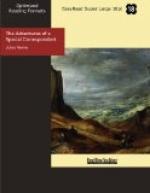Of course, the same driver and stoker will not take us through. They will be relieved every six hours. Russians will take us up to the frontier of Turkestan, and Chinese will take us on through China.
But there is one representative of the company who will not leave his post, and that is Popof, our head guard, a true Russian of soldierly bearing, hairy and bearded, with a folded overcoat and a Muscovite cap. I intend to talk a good deal with this gallant fellow, although he is not very talkative. If he does not despise a glass of vodka, opportunity offered, he may have a good deal to say to me; for ten years he has been on the Transcaspian between Uzun Ada and the Pamirs, and during the last month he has been all along the line to Pekin.
I call him No. 7 in my notebook, and I hope he will give me information enough. I only want a few incidents of the journey, just a few little incidents worthy of the Twentieth Century.
Among the passengers I see on the platform are a few Jews, recognizable more by their faces than their attire. Formerly, in Central Asia, they could only wear the “toppe,” a sort of round cap, and a plain rope belt, without any silk ornamentation—under pain of death. And I am told that they could ride on asses in certain towns and walk on foot in others. Now they wear the oriental turban and roll in their carriages if their purse allows of it. Who would hinder them now they are subjects of the White Czar, Russian citizens, rejoicing in civil and political rights equal to those of their Turkoman compatriots?
There are a few Tadjiks of Persian origin, the handsomest men you can imagine. They have booked for Merv, or Bokhara, or Samarkand, or Tachkend, or Kokhand, and will not pass the Russo-Chinese frontier. As a rule they are second-class passengers. Among the first-class passengers I noticed a few Usbegs of the ordinary type, with retreating foreheads and prominent cheek bones, and brown complexions, who were the lords of the country, and from whose families come the emirs and khans of Central Asia.
But are there not any Europeans in this Grand Transasiatic train? It must be confessed that I can only count five or six. There are a few commercial travelers from South Russia, and one of those inevitable gentlemen from the United Kingdom, who are inevitably to be found on the railways and steamboats. It is still necessary to obtain permission to travel on the Transcaspian, permission which the Russian administration does not willingly accord to an Englishman; but this man has apparently been able to get one.
And he seems to me to be worth notice. He is tall and thin, and looks quite the fifty years that his gray hairs proclaim him to be. His characteristic expression is one of haughtiness, or rather disdain, composed in equal parts of love of all things English and contempt for all things that are not. This type is occasionally so insupportable, even to his compatriots, that Dickens, Thackeray and others have often made fun of it. How he turned up his nose at the station at Uzun Ada, at the train, at the men, at the car in which he had secured a seat by placing in it his traveling bag! Let us call him No. 8 in my pocketbook.




